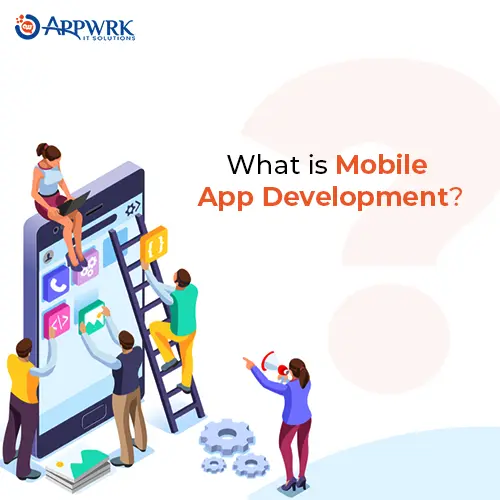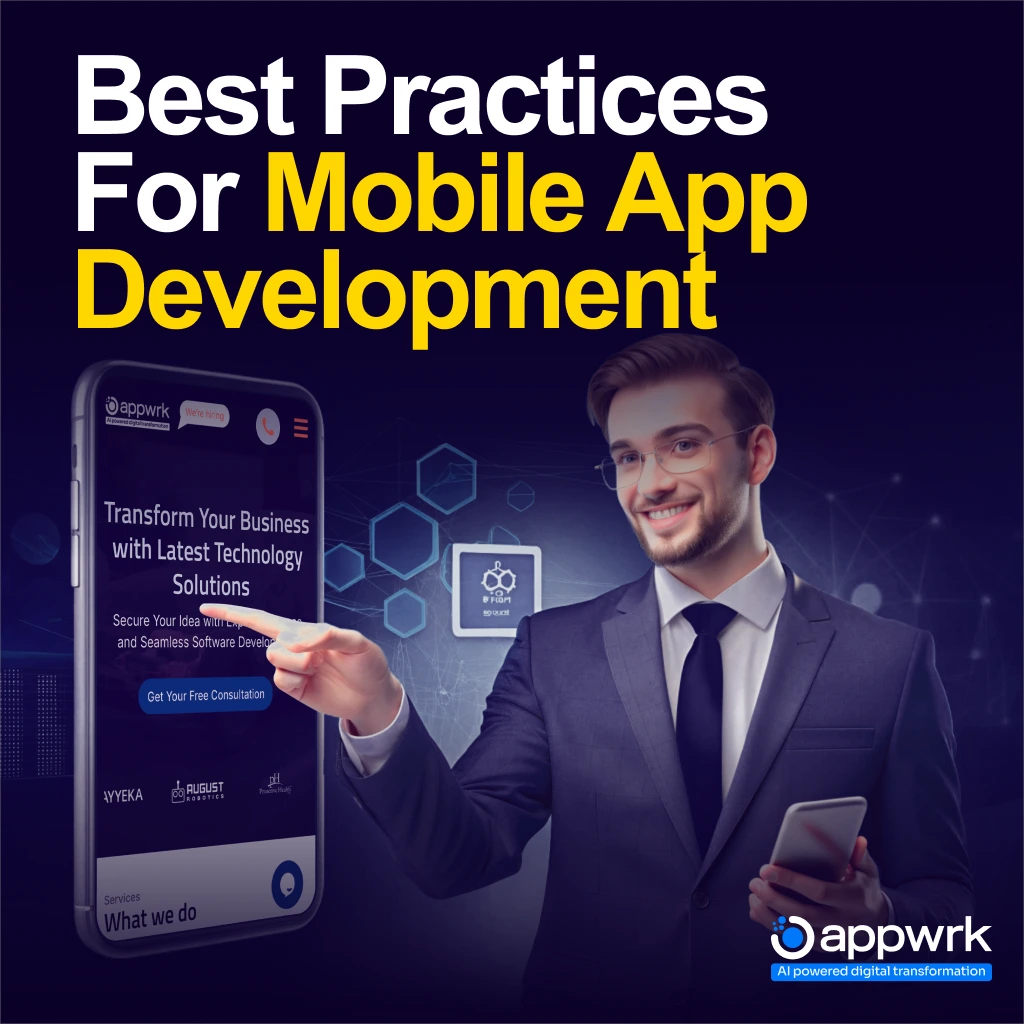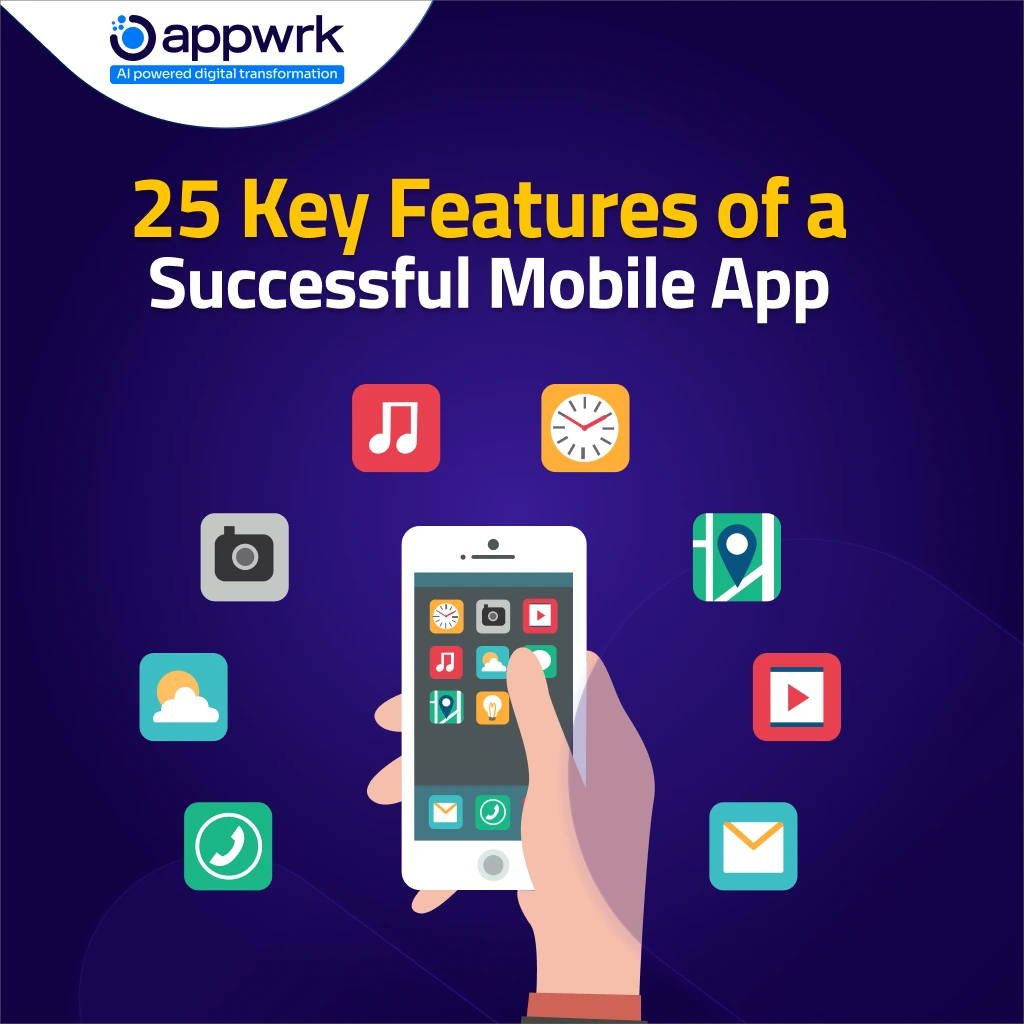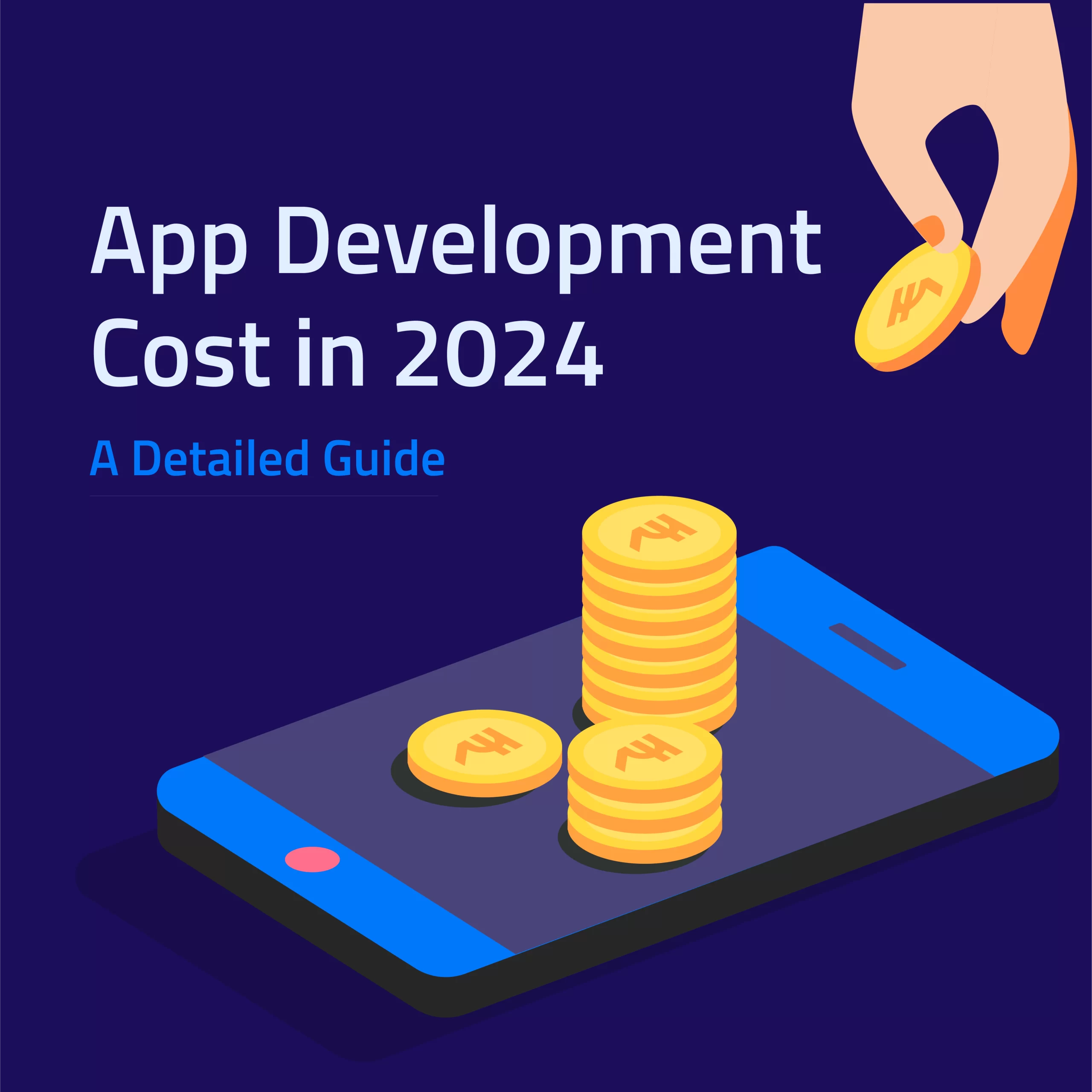Complete Guide to Mobile App Development (Process, Types, and Technologies)
With smartphone users increasing and applications becoming more and more popular with each passing day, many businesses and organizations are turning to mobile app development to broaden their appeal to the masses. Not only can mobile apps increase engagement and improve user experience, but they can also help companies attract and maintain customers, using them for the growth and expansion of their businesses. Needless to say, understanding the importance of the mobile app development lifecycle has become vital for entrepreneurs, developers, and businesses alike. Mobile app development has snowballed in the past decade, with apps ranging from retail, telecommunications, and e-commerce to government, healthcare, and insurance. According to Grand View Research, the global mobile application market was worth nearly USD 228.98 billion in 2023 and is expected to expand at 14.3% CAGR from 2024 to 2030.
The surge in mobile app popularity, driven by technological advancements such as more robust frameworks and low-code technologies, presents a golden opportunity for business executives. Mobile apps offer faster communication and enhanced customer experience compared to conventional websites and digital platforms.
This guide provides a comprehensive overview of mobile app development, offering insights into app development methodologies, key trends, and development costs to help you navigate the complexities of mobile app development and ensure that your app succeeds in today’s highly dynamic marketplace.
Table of contents
- What Is Mobile App Development?
- Why Mobile App Development is Best for Business
- Process to Develop a Mobile App
- Top Technologies Used for Mobile App Development for Businesses
- Different Types of Mobile Apps
- How APPWRK Digitized Highly Complex Medicare Service By Transforming it into an Interactive Mobile Application
- Cross-Platform Or Progressive Web Application?
- Mobile App Development Trends Businesses Need To Look Out For
- Top Mistakes to Avoid When Building Mobile Applications
What Is Mobile App Development?
Mobile application development is the process of making software for smartphones, tablets, and digital assistants, most commonly for the Android and iOS operating systems. Generally, a mobile app makes use of a network connection to make use of remote computing options. Therefore, the mobile app development process involves building installable software bundles, implementing backend services like data access with an API, and testing the application on target devices.
While app development is similar to web development, the main difference is the ability of apps to take advantage of the native features of mobile devices like GPS, camera, Bluetooth, ]sensors, microphone, and various other features. Mobile app development can be done for multiple operating systems, like Android and iOS, and it covers a wide range of applications, from games and productivity tools to social networking and e-commerce apps.
Why Mobile App Development is Best for Business
The development of a custom mobile app can enable businesses to reach customers in less time by notifying them of important messages or promotions directly on their mobile devices. Mobile app communication can also help ensure better customer satisfaction and engagement, ultimately leading to more purchases. Read on to explore why building mobile applications is best for businesses.
Increased Sales
In today’s era of cut-throat online competition, mobile applications can help businesses build stronger brand recognition than the competitors bridled to traditional marketing methods. It provides a competitive advantage to survive better than business rivals. A mobile application acts as another sales and marketing channel for a startup, assisting them in staying ahead of the competition and diverting their prospective customers toward themselves. It helps promote new brand activities, like campaigns or offers, promotes discounts and offers, and resolves customer queries instantly, leaving no scope for clefts in customer satisfaction and competitive excellence.
Reach a Wider Audience
When compared, mobile devices are more accessible to operate and have more economical options for accessing the net. Furthermore, top-notch accessibility from anywhere adds another feather to its golden hat. Mobile applications help build customer loyalty and furnish an understanding between customers and the brand. They deliver a portable and more enjoyable experience filled with excellent and convenient features and services that are challenging to derive from traditional heavy-set devices like personal computers or laptops. Therefore, mobile applications are necessary for startups to attain popularity and reputation quickly.
Provide More Value to Customers
One of the primary goals of businesses is to compete with their competitors to grab shoppers’ attention, which compels them to research, find, and deliver what their customers want. Mobile apps can help companies to provide value to their customers via unique mobile experiences. New technologies like geotargeting can help them contact customers nearing their brick-and-mortar shops. Mobile applications make business products or services easily accessible to users as they can access apps on the go, making them more likely to support their businesses. The push notifications help inform customers when they are not thinking about your brand. You can always research what any customer wants and offer app-exclusive discounts or an AI-powered chatbot to improve the shopper experience.
Build a Stronger Brand
With features like one-touch payment, easy navigation, and the ability to browse products and services anytime, anywhere, mobile apps can significantly enhance the shopping experience. This convenience often leads to more vital brand value and higher business revenue. With emerging technologies like AR/VR and AI, you can develop an app that can send push notifications, geotarget, ensure better product view pages, email or message your past customers as per their current requirements, target precisely, provide better product experience, and much more. All this will help the customers know more about your brand, which will help build a more substantial business presence.
Achieve Increased Customer Engagement Level
Generally, users spend seven times more time on mobile apps than on mobile browsers. Once your target customers have installed your mobile app, you can serve them more naturally, ensuring better customer engagement.
Increase Business Visibility
Did you know that 50% of users who actively engage with a branded app are more inclined to make purchases from that brand? Moreover, with an increasing number of mobile users, apps are now helping businesses reach an even larger number of audiences and provide technologies to leverage the maximum from this outreach via smartphones.
Also read: Is It Worth Hiring a Mobile Application Development Company?
Process to Develop a Mobile App
The process of mobile app development can vary a little on an individual basis. However, the below seven steps are the ones that you’ll mostly have to go through for app development, whether you’re developing an iOS, an Android, or a cross-platform app.

Strategy Development
When it comes to developing a mobile app, you must brainstorm to find out what you want from your app. Once you have finalized your idea, see what your competitors are doing in that domain. By researching your competitors, you can bypass the mistakes your competitors have been making while implementing those ideas. After doing competitive analysis, select specific platforms like iOS, Android, or Cross-platform.
Analysis and Planning
Once you have figured out the app idea and know where you are heading, you then need to do analysis and planning with the help of business analysis services for brainstorming, interviews, etc., to determine the functional and non-functional requirements for your app development. However, the project’s technical, economic, operational, and schedule feasibility is examined before deep-diving. Once the feasibility is proved, the business analysts prepare the SRS covering functional and nonfunctional requirements and constraints. Apart from these, you are required to develop a product roadmap and sort our technology stack. For the iOS app, you will be required to hire an iOS app developer. Similarly, you might need an Android or cross-platform app developer.
UI/UX Design
After you have prepared the SRS and selected the mobile application development platform, you are then required to prepare wireframes, style guides, information architecture, and prototypes. You will require hiring designers who will sit down and develop the UI/UX design. Visual designs like mockups and prototypes are created, ensuring the app design is user-friendly, visually appealing, and intuitive. The process has been the same for all platforms, native or non-native. Native platforms are Android and iOS. Non-native or cross-platform options are like React Native, Maui, and Ionic.
App Development
The development stage is where you actually begin to write the code for the “final” version of the app. You need to develop backend and front-end sections for your app. While backend development will demand you hire some software programmers with knowledge of programming languages and databases, for the front end, you will be necessitating hiring some UI/UX designers, also known as front-end designers. Remember, the front-end design process is different for native apps. Cross-platform apps and hybrid apps. Hire the front-end designers accordingly.
Mobile App Testing
After the Android or iOS app design is developed and your developers have finished implementing the front-end and back-end, it’s time to bring your app to perfection. For this, you need QA specialists to test functionalities, performance, and security.
Deployment
Once the entire code is ready and the app is adequately tested for each functionality, you need to deploy it to the first test environment. Once the final testing is complete, the app is shifted from the testing environment to the live environment.
Support and Performance Monitoring
This stage begins at the same time as a release and should progress in parallel. Maintenance is where you monitor the status of your app, fix any bugs that may be present, and ensure the app continues to work as expected. Updating your app for new OS versions or supporting new devices is also a part of maintenance.
Also read: What is the Process of Mobile App Development?
Top Technologies Used for Mobile App Development for Businesses
With the advent of cutting-edge technologies like Swift, Kotlin, and Flutter, mobile app development has grown exponentially over the years. Below are the top mobile application development technologies used to create state-of-the-art apps.
Swift
Developed by Apple, Swift is a powerful and intuitive programming language for iOS, iPadOS, macOS, tvOS, and watchOS. Compared to its predecessor, Objective-C, Swift is much more efficient and can solve issues of Objective-C like complex syntaxes, poor memory management, lack of modern language features like closures, type interfaces and generics, interoperability, and performance issues. Swift’s safety features and speedy performance enhance native iOS app creation for a better user experience.
Kotlin
Developed by JetBrains, Kotlin is a cross-platform, statically typed, general-purpose, high-level programming language with type inference. Java faced issues like syntax complexity, interoperability, and a need for modern language features, just like Objective C. The inclusion of Kotlin solved the problems perfectly. Also, Google is providing support for Kotlin in Android app development.
Java
Developed by Sun, Java was acquired by Oracle and is used for Android app development, just like C++. Java is still a requirement for legacy codebases and performance-critical apps. Some mobile application developers also personally prefer Java over Kotlin.
React Native
Also known as RN, React Native is a renowned JavaScript-based mobile app framework that allows you to build natively rendered mobile apps for iOS and Android. It will give the feeling that you are making an app specifically for iOS or Android while writing the code in JavaScript.
Flutter
Google developed Flutter to support cross-platform development without compromising quality, speed, or performance. Flutter is better than React Native even as it provides complete control over the rendering stack and support for reactive view without bridging with native environments like iOS and Android. While it ensures a great development experience via hot reload, it also provides the past performance of apps through the support for Just-in-time and ahead-of-time approaches.
Different Types of Mobile Apps
When it comes to developing different forms of mobile apps, businesses have several options, such as native, non-native, hybrid, and progressive web apps. While native apps are specific to one platform, ensuring the best performance and user experience, hybrid apps combine elements of Native and Web, offering cross-platform compatibility and cost-effectiveness. Read on to learn about the different types of mobile apps.
Cross-Platform Native Mobile Applications
As the name suggests, cross-platform mobile applications are developed to function on multiple platforms. Apps built using platforms like React Native, Ionic, or Maui, whose code is compiled to a native platform-compatible code using a transpiler, are called cross-platform native mobile applications. Remember, these app views are rendered in native app environments like Android and iOS.
Native Mobile Applications
Apps built for a specific device, such as Android or iOS, are native mobile applications. These powerful platforms provide more features and support from top companies like Apple and Google, so app developers opt for them when developing complex and large mobile applications.
Hybrid Mobile Applications
When native and web app features are combined, hybrid Mobile Applications are created. These applications use HTML, CSS, JavaScript, and native app features or services like GPS and cameras. This app development strategy has some limitations, as it cannot use all native app features or services and hence fails to serve when developing large and complex mobile applications.
Progressive Web Application (PWA)
Progressive web applications (PWAs) are built using web app development platforms but can be installed and run on any native app platform, whether Android or iOS. They can work offline with or without any internet connection and can be searched and found via search engines without going to any app store. They are highly secure, cost-effective, and smaller than mobile apps, requiring less bandwidth.
Also read: What are the Programming Languages used for Mobile App Development, and Which One is Popular?
How APPWRK Digitized Highly Complex Medicare Service By Transforming it into an Interactive Mobile Application
As a dedicated mobile app development firm, APPWRK played a pivotal role in bringing Medicare right to the fingertips of Romanian citizens using digital strategy by successfully launching healthcare-based Beesers mobile apps. Beesers is a healthcare application that allows caretakers to provide service to their dearest ones within Romania. Employers can create accounts for the services, while providers can register their profiles to show what they offer. Employers have the ability to create, alter, and remove schedules, while suppliers can accept requests.
It comprises four different applications for users: an Admin Panel, a Provider Mobile app, a Client Mobile app, and a Backend to provide APIs. The primary targeted audience of buyers is people who want medical services online due to their busy schedules, old age, physical challenges, and working professionals. Online healthcare services in Romania rank 47th. APPWRK completed this healthcare app for a small business in a record 25 months.
While APPWRK used the traditional method to leverage the most advanced front-end tools, the developers via tools like redux Express. JS, HTML 5, React JS, React Native, MySql, Node JS, and FeathersJS Redux ensured a lightning-fast medicare appointment facility to facilitate the medicare facility right at the patient’s doorsteps.

Challenges We Faced
- One of our challenges was designing a unique and user-friendly UI. However, our goal was to create a user interface that made this application simple to use.
- The second difficulty we faced was the admin interface, which allows employers and service providers to access the app easily.
Impact
- This application has made it possible for users to book a healthcare provider for doorstep medical services.
- This application is beneficial to patients who cannot travel to a hospital for medical treatment. The user can communicate with a healthcare provider and receive real-time medical advice.
With User-Friendly design, smart use of Dynamic Listing, Dynamic Cards, and Cross-Platform Application Design, APPWRK has developed this app by implementing mobile push notifications, chat service, and Google Maps API and used the memory cache to save the most frequently visited data and Integrated BT(Banca Transvilania) Payment Gateway apart from implementing 3d secure2 payments to ensure hassle-free and highly secure appointment booking with few click payment facility. The app has been running successfully since deployment.
Now that we have witnessed how APPWRK’s healthcare app resulted in the brand’s massive digital transformation of medical services, it’s the right time to sneak a peek into the latest mobile app development trends that you must know in 2024.
Cross-Platform Or Progressive Web Application?
While cross-platform technologies like React Native and Ionic have grown in popularity, the Progressive web app has gone even further. Read on to find out the advantages/disadvantages of cross-platform apps and progressive web applications.
Cross-Platform Advantages
- Cross-platform apps can run both iOS and Android. Hence, they help target a more extensive audience base comprising both operating systems.
- Cross-platform apps are easier to manage than native apps, as updates on one platform can be synced across all platforms.
- Cross-platform app development demands less development time.
Cross-Platform Disadvantages
- There can be performance-based issues on some operating systems; hence, you must debug more frequently.
- There can be some security issues.
- Since cross-platform apps are not frequently updated, you might have to wait longer to implement new features.
Progressive Web Application Advantages
- Progressive web application development requires less investment than native apps.
- They can be easily installed across several platforms.
- They can be installed on any device as they are cross-platform.
- Progress web applications offer a better user experience.
Progressive Web Application Disadvantages
- Progressive web apps offer a smaller number of functions, thereby affecting user experience.
- Functionalities that require Bluetooth or NFC can be limited when using PWAs from within the app.
- Progressive web applications are not available in the app stores.
Hybrid vs Native Apps
Hybrid apps feel and look like Native apps but are developed using HTML, CSS, and JavaScript. On the other hand, Native apps are built using iOS and Android, and their front end is also built using HTML, CSS, and JavaScript. Angular and React are also used for the front end.
Hybrid App Advantages
- Hybrid apps are cheaper to develop than cross-platform native apps.
- They look similar to native apps.
- They can be easily created with just HTML, CSS, and JavaScript.
- Hybrid apps require less development time.
Hybrid App Disadvantages
- Hybrid apps might perform poorly on some old devices.
- They do not work for certain types of apps.
- They are limited in features.
Native App Advantages
- Native apps are robust and feature-rich.
- They are perfect in performance.
- They can be developed in IDEs like X-Code and Android Studio.
- They run smoothly on even older devices.
Native App Disadvantages
- Native apps support one specific set of devices and OS.
- They require heavy investment.
- The development tools used could be more user-friendly.
- They require frequent updates as they are prone to bugs.
Also read: 5 Best Cross-Platform Frameworks for Mobile App Development
Mobile App Development Trends Businesses Need To Look Out For
Over the years, mobile app development technology has improved by leaps and bounds, creating new opportunities for businesses to broaden their customer reach and improve operational efficiency. Organizations are now embracing trends like AI-driven automation or AR integration to achieve their goals and objectives. Businesses can now proactively adapt to stay ahead of their competitors. Below, we dive deep into some of the latest trends in mobile app development.
Generative AI
Generative AI (GenAI) has become a cornerstone in revolutionizing how we create everything from emails and videos to brand-new applications. While the generated code can be hard to understand, if well-researched and vulnerabilities checked properly, Generative AI can help in mobile application development in much less time.
Internet of Things (IoT)
The Internet of Things (IoT) is a chain of physical objects linked with sensors, software, and other technologies specifically for connecting and exchanging data with different devices and systems via the Internet. These days, IoTs are extensively integrated with mobile applications to harness data like atmospheric pressure, weather forecasting data like average rainfall, pressure applied on the dams, and data collected through autonomous cars. They are likewise also presented to audiences via intuitive front-end views.
5G
5G wireless technology delivers higher multi-Gbps peak data speeds with ultra-low latency. It is more reliable, comes with colossal network capacity, and can ensure increased availability. It can also provide a uniform user experience for both web and mobile users. It can empower new user experiences and interconnect new industries via mobile apps with higher performance and improved efficiency.
Predictive Analytics
Machine learning and AI are integral to modern mobile application development. Businesses can only survive with predictive analytics, as it requires making decisions and wants them to be accurate. Whether it is customer segmentation or decision-making, it takes time to survive with predictive analytics.
Blockchain
Blockchain, with its foundational principles of decentralization and transparency, serves as a robust catalyst for enhancing mobile app security. Unlike traditional security measures, blockchain’s decentralized system minimizes the risk associated with a single point of failure.
Also read: Top 12 iOS App Development Trends to Watch Out for in 2024
Top Mistakes to Avoid When Building Mobile Applications
As you embark on the mobile app development journey, you must be aware of the pitfalls and learn how to avoid the common mistakes businesses make when developing a mobile app to create a successful application. From not understanding your target audience to underestimating the cost of development, these errors can significantly impact user experience and overall performance. Furthermore, paying attention to platform guidelines or choosing an inexperienced developer may lead to a subpar final product.
Here are some of the mistakes that you need to avoid when building a mobile application.
Lack of Proper Targeting
One of the common mistakes businesses make when developing a mobile app is forgetting to identify their target audiences and deliver what they want. This can result in app failure and a complete waste of money.
Building a Poor UI
Often, developers need to be more severe about UI when developing mobile apps—the UX and not just UI need equal consideration.
Lack of Monetization Strategy
Monetization is essential for planning, building, and marketing a mobile application. Many developers make the mistake of not using the monetizing strategy required to ensure the sustainability of their business with their apps because revenue generation can transform apps into sustainable projects. Needless to say, having a monetizing strategy can give a significant boost to your mobile application development project.
Adding Too Many Features
Let’s face it: too many features can overwhelm and confuse users. Developers sometimes need to focus on creating apps with essential features to provide a seamless user experience. A successful app should have a clear focus and ensure a seamless user experience.
Also read: 10 Critical mistakes to avoid while Mobile and Web App Development for Business

Conclusion
In today’s highly competitive business world, mobile apps have become crucial resources for contemporary firms because of their elevated user engagement, accessibility, and potential for competitive advantage and revenue. From communication and entertainment to productivity and commerce, they provide a wide range of capabilities for businesses that want to build their brand. Mobile apps help companies reach larger masses and offer numerous advantages, like showcasing an interface for selling business products worldwide and assisting teams in real-time collaboration. Want to take your business to the next level with a cutting-edge mobile app? APPWRK IT Solutions offers a wide array of mobile application development services, ranging from Android app development to iOS app development, at a price that’ll fit right into your budget.
Contact us now to transform your business idea into a highly intuitive and well-designed mobile app in the platform that best suits your specific requirements.
How to Hire a Mobile App Development Company?
Mobile app development companies often need help understanding the client’s requirements, which causes outsourcing companies to face nightmares. They eventually leave the projects incomplete, so you must be cautious while selecting a mobile application development company for your requirements.
- What, as a customer, you can do is ask a few questions as below:
- How does the development company start the project, and what is the background of its executive team and members? Moreover, what is its mission?
- How do they design the app from the beginning to the end, and what will the deliverables be?
- What is their project approach, and what are the main risks and variables that will drive the project outcome? How will the app drive customer adoption and use? What are their risk management policies?
- What is the quality assurance process like?
- Do they provide technical documentation? What does it look like?
These questions will be when you select the mobile application development company and when you hire an Android or iOS app developer freelance. In that case, you can also ask how they will handle different mobile app development processes as a one-person team.
Lastly, you should check their portfolio and talk to some of their clients before hiring them.
Now, as you are onboarded for the mobile application, make sure two things:
- Check whether the app development company follows the Agile app development methodology and not the old traditional waterfall model.
- Secondly, their first delivery is an MVP, or minimal viable product, that comes with the most essential features. This will allow your app users to share their feedback and let you know what further features they would like in the app.
Also Read: How to Choose the Best Mobile Application Development Company for Your Business
What is the Cost of Developing a Mobile App?
You need to understand how much mobile app development will actually cost. A mobile app can cost between $25000 and $300000. While this is a rough estimate, the app cost will be influenced by factors like the app’s purpose, chosen development platform, complexity level, app development company size, and the development company’s geographical location.
For more details on the cost, consult the article below.
Android App Development Cost Guide 2024: Complete Breakdown
How can APPWRK Help in the App Development Journey?
Our mobile app development guide will give you insight into the development process. With over 12 years of experience and having successfully delivered thousands of apps, our experts are proficient at converting your business ideas into successful mobile applications across various industries.
With deep industry knowledge and proficiency in cutting-edge technologies, our development team is capable of meeting your specific requirements. Moreover, we adhere to the policy of providing the best quality work while also ensuring the most stringent security standards.
Why should I Entrust My App Development Process to APPWRK?
When we kickstart a mobile app development project here at Appwrk, we divide the requirements into small functional requirements, which are further transformed into user stories. This serves as the basis of our mobile app development process.
We follow agile methodology and work in two-week sprints. We continuously recheck our work until we accomplish milestones in the app development process. We become more agile if the app requires more features and smaller deadlines.
The method has been proven to work on projects with thousands of development requirements.
What are the Hidden Costs of Software I Need to Anticipate AFTER I Launch the App?
Some hidden costs are the cost of an app store, cross-platform development, design, data storage, mid-project, multiple device testing, maintenance, and marketing expenses.
What are the Different Ways to Build a Mobile App
Various ways are used, such as building native or non-native apps like cross-platform, hybrid, web mobile, and progressive web apps. Native apps are like iOS and Android apps. Web mobile apps are run via mobile browsers, and hybrid apps are web apps that are wrapped in a native environment and, in fact, rendered in a native environment. PWA can be searched through search engines and can be executed from any device, may it be macOS, watchOS, any native environment, or even web browsers.
What to Expect from a Mobile App Development Platform
You can expect many features, such as regular updates, top-notch security, fast execution, and the most advanced design features.
What Steps Does APPWRK Take Before Starting Mobile App Development?
While the process begins with the client’s approval of the project, it all starts with the client’s onboarding. As required, various communication channels are established for high-level talks and conversations with the internal team. Our team of business analysts discusses the project requirement further and checks for feasibility. On success, the project SRS and other relevant documents, as we discussed in our guide, are prepared. Only then does the actual mobile app development work start.
Also Read: 15 Steps to Consider Before Starting Mobile App Development
Do You Also Promote the Apps that You Have Developed?
Our in-house SEO team can help promote your apps via app stores and other means.
About The Author






 Free Quote
Free Quote
















































